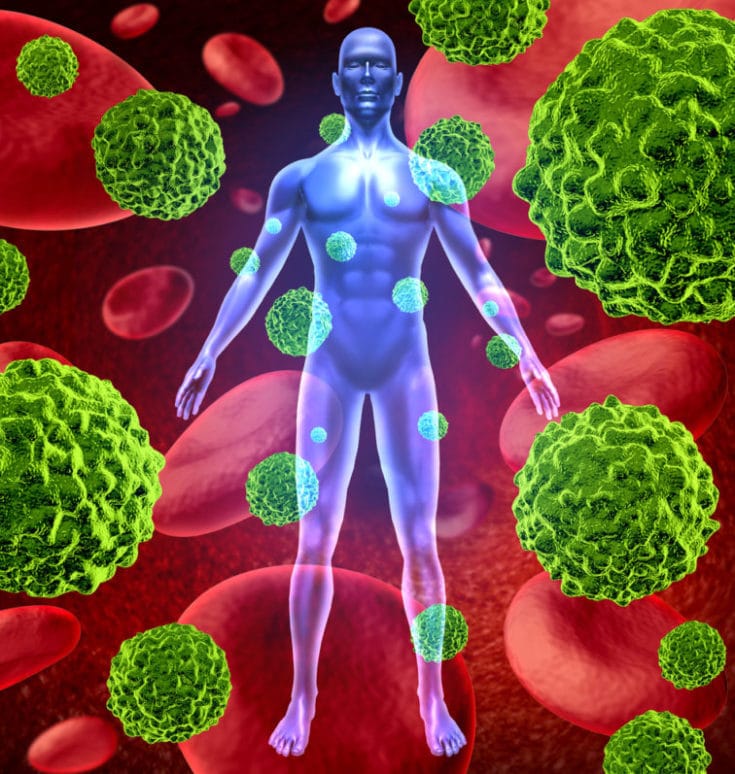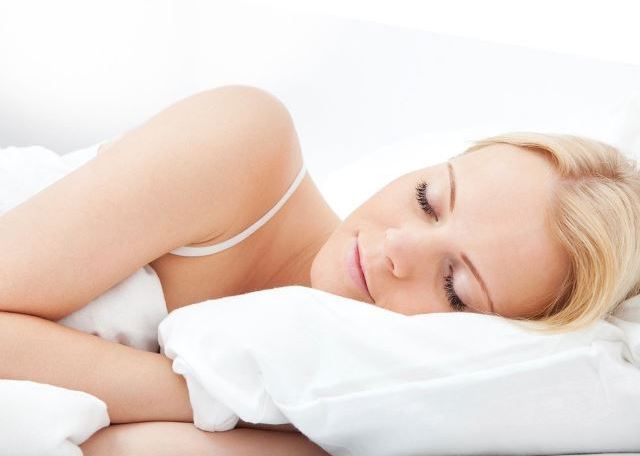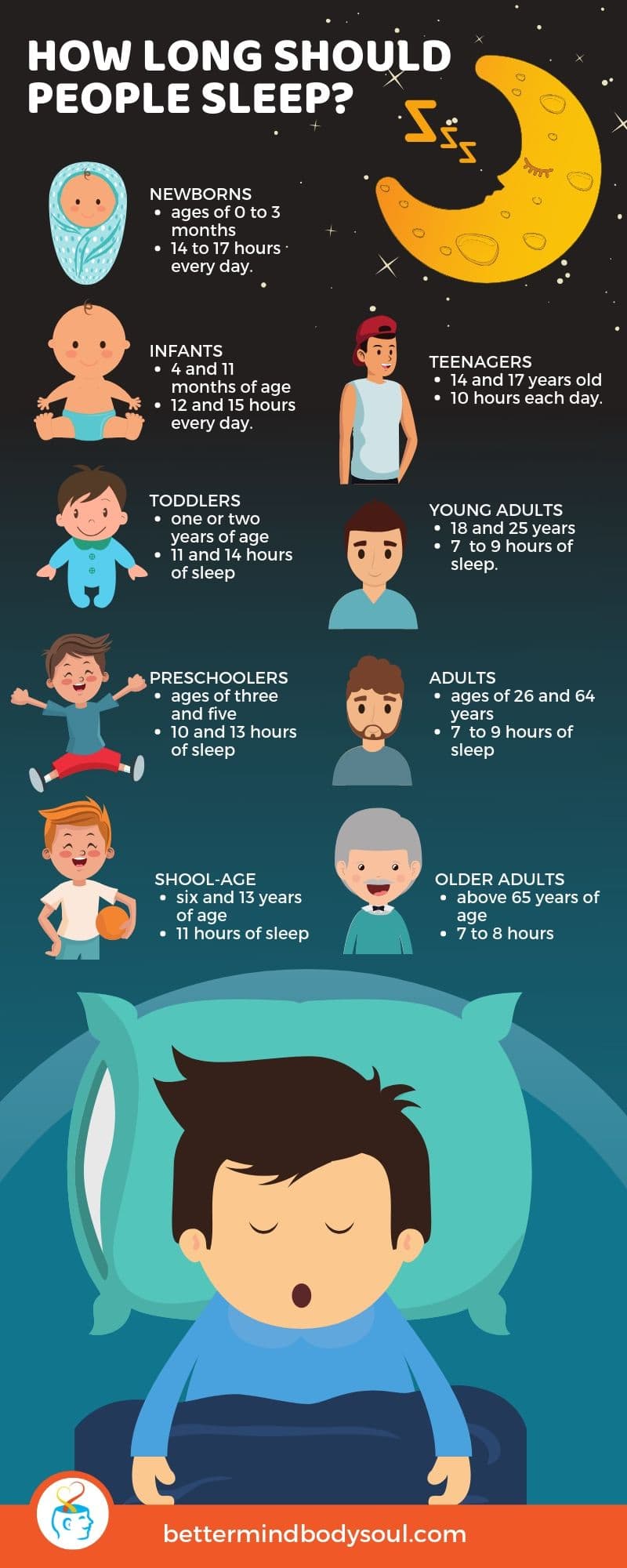Probably one of the falsest things your friends told you when you were younger and had to be convinced to go out is “sleep is for the weak”. To this day, this is one of the falsest statements ever made. The correct version would be “sleep to stay strong”. Sleeping is an important biological process that the human body has to undergo in order for other bodily functions to do their job.
Sleep is actually a complex process, a ritual if you will, and there is actually a right and a wrong way to do it.
How Long Should People Sleep?
It’s true that every person requires a different amount of sleep in order to wake up energized. However, doctors can recommend certain intervals, with minimum and maximum ranges, for each age category. With that in mind, here’s how much people should sleep:

- Newborns between the ages of zero to three months should sleep 14 to 17 hours every day.
- Infants between four and 11 months of age should sleep between 12 and 15 hours every day.
- Toddlers of one or two years of age need to sleep between 11 and 14 hours.
- Preschoolers between the ages of three and five need about 10 to 13 hours of sleep.
- School-age children between six and 13 years need nine to 11 hours of sleep.
- Teenagers between 14 and 17 years old need to sleep eight to 10 hours each day.
- Young adults of ages between 18 and 25 years need about seven to nine hours of sleep.
- Adults between the ages of 26 and 64 years also need seven to nine hours of sleep.
- Older adults that are above 65 years of age should sleep about seven to eight hours.
What Is Sleep Deprivation?

Here is an interesting fact: there is such a thing as sleep “debt”. That means that the more hours of sleep a person misses, the more hours they will need to compensate for the lack of sleep in the next few days. Your body literally creates a sleep debt, and it eventually has to collect, or you will collapse.
People seem to think that they can “trick” their bodies by training them to get adjusted with less hours of sleep every night, but the truth is, there people will never function at their fullest capacity on a schedule based on sleep deprivation. But lack of sleep causes you to lose your reaction time, decreases your ability to concentrate, your capacity to learn new things or remember old ones.
Before diving into why power naps can be an important means to help compensate for sleep deprivation, one must first understand the toll that lack of sleep takes on both the body and the mind. Not only does less sleep impair your cognitive functions, but it also weakens your immune system and puts your life at risk.
Affects Immune System

When you sleep, your body works to create protective barriers, one that can help fight of viruses, bacteria, and infections, by producing substances like cytokines, which help do just that. If you’re awake, your immune system can’t work in your favor, meaning it’s less capable of fighting off “intruders”, making it more difficult for you to recover in case you fall sick.
Have you ever wondered why, when you’re trying to deal with a flu virus, the doctor recommends plenty of bed rest and sleep? It’s precisely because this gives your immune system the chance to fight off the virus.
Messes with the Digestive System
The lack of sleep affects the production of two hormones in your body. Known as the “hunger hormones”leptin and ghrelin control your appetite.

- Ghrelin is the appetite increaser. It is released in the stomach and sends signals to your brain, telling it you feel hungry and it’s time to eat.
- Leptin is an appetite suppressor. It tells the brain that your current food levels are enough to keep you energized, and that you don’t require any more food for the time being.
It is believed that when you don’t get enough sleep, your leptin levels decrease, causing your ghrelin levels to increase. This means that you are likely to eat despite your body not being in need of more nutrition. Have your ever felt the need for a snack when staying awake in the middle of the night? This could be your explanation.
This is one way that lack of sleep can cause people to gain weight. Another way it does that is by making the body feel too tired to exercise. Naturally, when you don’t get enough sleep, your energy levels drop, which makes it less likely for you to exercise.
Impairs the Central Nervous System
Sleep deprivation takes a really big toll on a person’s central nervous system:

- When you’re asleep, your brain makes connections between your neurons, making it easier for you to remember information. If you study for a test, for example, but fail to get a good night’s sleep afterwards, you are less likely to remember what you’ve studied.
- Lack of sleep also makes it difficult for people to focus on learning new information. That’s because the brain feels exhausted and is less capable of storing information.
- Sleep deprivation also affects coordination. Your brain is slower in sending signals to the rest of your body, which explains why it’s difficult to quickly respond to stimuli.
- People who don’t get enough sleep are more susceptible to mood swings. They are more likely to get angry really fast, shift from happy to sad, feel paranoid, or become irritated faster. This can affect a person’s work and personal relationships, because they are more likely to start a fight out of the blue.
- Because it affects the brain, lack of sleep can lead to a decrease in a person’s creativity.
- If sleep deprivation continues over a longer period of time, it can lead to hallucinations, anxiety, depression, or impulse behaviour.
Exposes You to Microsleep

When you’ve stayed awake for far too long, you are likely to doze off unexpectedly, because the body can’t take anymore and just shuts down on its own. This is called microsleep, and it’s a very dangerous thing to experience.
The thing about microsleep is that it comes with no warning (unless you consider your recent lack of sleep a warning, which should be enough in that case). People that are about to fall in a state of microsleep may start blinking really slow, have a blank stare, have their head drop suddenly, be slow to respond to information, or have really short term memory loss (can’t remember what happened in the last two minutes).
While it may not sound like much, microsleep can occur when you’re performing tasks that require your maximum attention, such as driving a car or operating heavy machinery. This can put your life and the life of others in danger.
The Power of Naps
As experts will tell you, power naps are actually a great way to deal with sleep deprivation, because there are situations where you simply can’t get a full eight hours of sleep without interruptions (like when you have a baby constantly making you up in the middle of the night).
Even 20 minutes of napping can bring you solid benefits. When you nap, your entire system shuts down, even if it’s only for a brief period of time. Think of your body as a computer that’s overheating because the components inside have been working for too long.
When you shut it down even for a little while, you give the parts a change to “cool off” and be ready when you want to reboot the system. A nap can increase your performance and can give you the energy boost needed to continue whatever it is you need to do for a few more hours.

Naturally, the brain-boosting benefits that you get depend on how much you nap, and the type of sleep you get to have. For example, a 20-minute power nap can provide you with enough juice to increase your mind’s alertness, but also to enhance your learning skills.
If you were to take a nap longer than 20 minutes, you’d be boosting the part of the brain that’s in charge of your memory, plus you’d feel more creative.
There is this concept called “slow-wave sleep”, which is characteristic when you nap between 30 and 60 minutes. By doing so, you can improve your decision-making skills, which also makes you better at remembering things.
Then, there’s REM (rapid eye movement) sleep, which occurs in naps that last between 60 and 90 minutes. This helps your brain make new connections, plus helps you come up with creative solutions to different kinds of problems.
So, how does one make the best of a power nap?
- Make sure that you nap every day. When you’re consistent about your naps, you are more likely to get the best results. Consistency also means that you should nap every time during the same interval, preferably afternoon, between 1 p.m. and 3 p.m.
- Your nap will be more profound if you sleep in a room that’s as dark as possible. If you’re at home, pull the curtains. If you can’t afford the luxury of a pitch-black room, then buy an eye mask. Light decreases your melatonin production, and the less melatonin your body has, the more difficult it will be for you to fall asleep.
- A nap is just that: a nap. That means that you should sleep way too many hours. For some of you, this means that you should set your alarm for either 30, 60, or 90 minutes, depends on how much time your have available. But even when you’re short on time, remember that even a 30-minute nap can do wonders for your concentration and energy levels.
Ups & Down of Napping
According to the National Sleep Foundation, there are three different types of naps:

- Planned napping is when you actually have the time to plan a nap prior to feeling sleeping. This is most common amongst people who know they have to stay up late at night, and try to catch a shut eye prior to that, to avoid feeling tired really early.
- Emergency napping is the go-to solution for people who are feeling extremely tired and have to get some shut eye because they are unable to continue with their normal activities for the time being.
- Habitual napping is consistent and is characterized by taking short naps during the same time interval every day.
- Napping is highly beneficial when you sleep between 30 to 90 minutes max.
- It can help you get an energy boost that allows you to resume your activities that you would be otherwise unable to do because you feel tired.
- They can be useful when you have to work during the night and need to rest your body and your mind during the day, to stay awake for as long as possible.
- Habitual napping is sometimes prescribed as part of the treatment for people who have narcolepsy.
- Naps give people a chance to relax and disconnect when they’re feeling overwhelmed or are in a bad emotional state.
- Naps can help calm the nerves of someone who is feeling anxious or angry.

Contrary to popular belief, naps are not a sign of laziness, but rather a responsible thing to do to actually maximize your productivity when you’re awake. But that doesn’t mean naps have absolutely no negative aspects to them:
- There are certain people who wake up from a short deep sleep feeling very groggy and confused. While this state normally passes in a few minutes, it might cause inconvenience for those who have to be alert the second they wake up (like those who nap during their lunch break and have to resume work immediately after).
- Napping unexpectedly during the day might cause you to stay awake too much at night. A refreshing one-hour nap during the day can give certain people so much energy, it causes them to fall asleep harder at night.
Conclusion
Sleep deprivation is one of the worst things you can do for both your physical health and your mental state. Research has clearly shown that there are negative consequences to not getting enough rest, from a weakened immune system to the chance of microsleep, which can be fatal if you are performing tasks such as driving when it occurs.
Naps are a great way to compensate for a little bit of sleep lost during the night, as there are situations when you simply can’t afford a full eight hours of interrupted sleep. Depending on the length of your nap, you can draw benefits that range from a boost of energy to increase creativity and better memory.
Check out our infographic and don’t forget to share!

The post How Long to Nap for The Biggest Benefits? appeared first on Better Mind Body Soul.
No comments:
Post a Comment